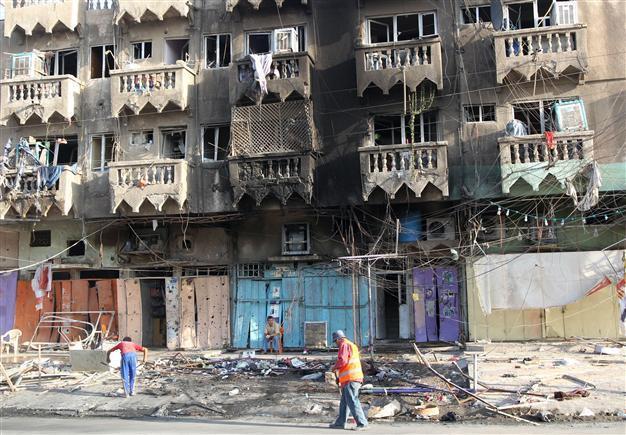More prison breaks on its way: Al-Qaeda
DUBAI

An Iraqi worker cleans the pavement on August 11, 2013 on the scene of a car bomb attack that occured the day before in the northern Baghdad neighbourhood of Shaab. AFP PHOTO ALI AL-SAADI
The leader of al-Qaeda in the Arabian Peninsula (AQAP), Nasser al-Wuhayshi, vowed on Aug. 12 that imprisoned members of the terror network would be freed.
In a “letter to the captives in the tyrants’ prisons” the head of al-Qaeda’s Yemeni branch said “the detention (of the network’s prisoners) cannot last.”
“The imprisonment will not last and the chains will be broken,” he said, adding that this would happen soon. “Your brothers are about to bring down the walls and thrones of evil... and victory is within reach.” He added: “We’re all on the same ship, some on the deck and others in the bunt and each team owes its survival to the other.” Al-Qaeda claimed responsibility for simultaneous raids on two Iraqi prisons, setting more than 500 inmates free in July. On July 27, more than 1,000 inmates broke out of a prison on the outskirts of Benghazi in Libya, following what an official said was an attack on the facility.
Iraq bombings claimedAl-Qaeda claimed responsibility for simultaneous raids on two Iraqi prisons, setting more than 500 inmates free in July. On July 27, more than 1,000 inmates broke out of a prison on the outskirts of Benghazi in Libya, following what an official said was an attack on the facility.
It was not clear who was behind the assault. Al-Wuhayshi, a former aide to al-Qaeda’s late founder Osama bin Laden, tunneled his way out of prison to become head of AQAP in 2007.
In July 2011, al-Wuhayshi pledged allegiance to Bin Laden’s successor, Ayman al-Zawahiri. His group, at the heart of the latest U.S. security alert, has claimed responsibility for several attacks, including an attempt to blow up a U.S. commercial airliner on Christmas Day 2009. On Aug. 11 an attack by “al-Qaeda elements” at a gas export terminal in Yemen killed five soldiers, a military source said, as Washington kept its embassy in Sanaa closed.
The attack followed a wave of U.S. drone strikes against suspected al-Qaeda militants in Yemen that has killed 38 people since July 28.
The United States said last week that all of the embassies it shut down due to the security alert would reopen this week, except the mission in Yemen.
Meanwhile, an al-Qaeda affiliate said it carried out Aug. 10’s bombings in Iraq, which killed dozens of people, in response to a government campaign to arrest suspected militants.
The statement from Islamic State in Iraq and the Levant (ISIL), posted on Jihadist forums, claimed responsibility for the attacks across Baghdad and in provinces in southern Iraq targeting people celebrating the end of the Muslim fasting month of Ramadan. In response to mass jail breaks, Iraqi security forces have carried out an “Avenge the Martyrs” campaign to arrest suspected militants.
”They will pay a high price for what they did, and they will not be secure day or night during Eid or other times, so they should watch their footsteps and stop the detention campaigns and cease harming the Sunni clans,” the ISIL statement said.
